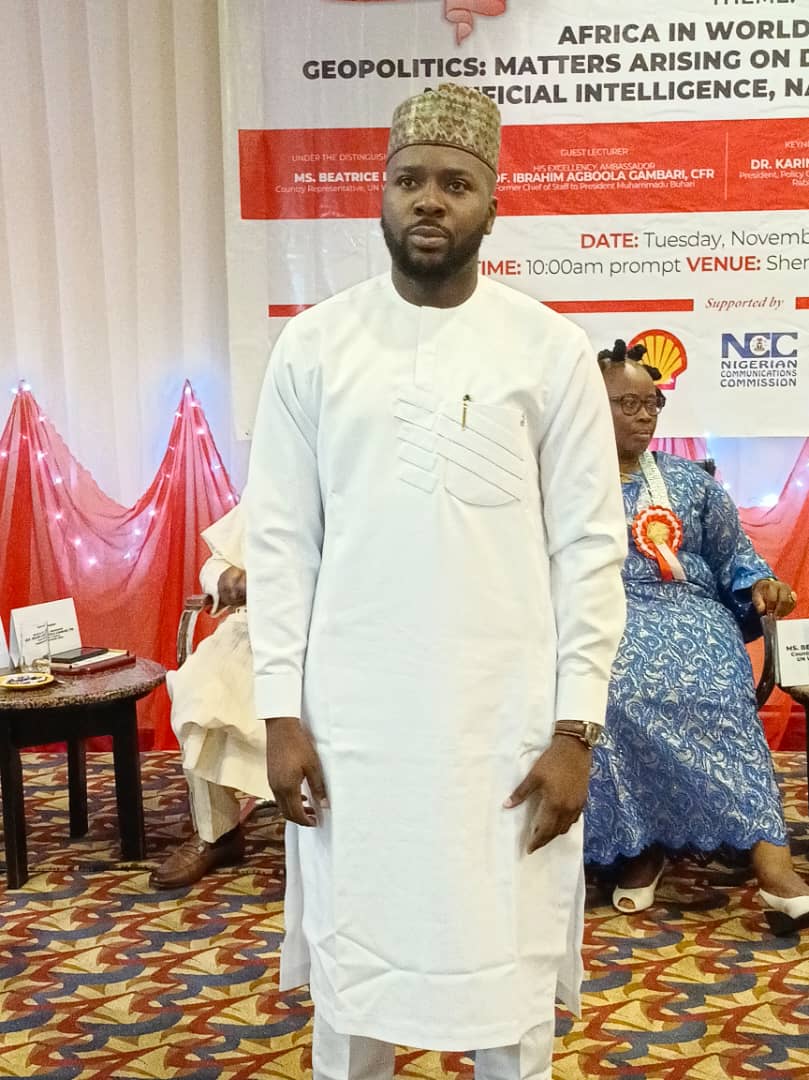Latest News
Technology, artificial intelligence no longer optional for Africa - Shehu Tijjani

…says Africa’s youth can be empowered to lead the continent in global innovation and economic growth with right investments in education and skill-building
SHEHU Tijjani, managing director of Amal Technologies Limited says he believes that Technology, Artificial Intelligence are fields that have become essential for Africa to secure its place in the global digital economy.
Speaking at a panel discussion at the 12th Realnews Anniversary Lecture on Tuesday in Lagos, Tijjani noted that as technology accelerates, Africa faces an extraordinary opportunity to leapfrog into the global digital economy.
Contributing to the theme “Africa in World Shifting Geopolitics: Matters Arising on Demography, Technology, Artificial Intelligence, National Resources, he described the theme of this year’s Realnews event as “one of the defining topics of our time”.
He stated that the knowledge of this opportunity is what has driven Amal Technologies into championing a vision to empower Nigerian youth by aligning their training and development with industry needs, particularly in fields essential to hightech manufacturing and innovation.
“We’re witnessing a revolution driven by artificial intelligence, but this revolution will be incomplete if it’s not inclusive. At Amal Technologies, we emphasize R&D in electronics manufacturing and the emerging semiconductor industry. By prioritizing indigenous innovation, Africa can position itself as a contributor, not just a consumer, of technology. Imagine an Africa that not only develops but exports AI solutions tailored for agriculture, healthcare, education, and more transforming daily life for millions while addressing our unique challenges.
“Africa is poised at a critical juncture with the potential to take significant strides in the global digital economy. As technology rapidly advances, the youth-led demographic in Africa presents a powerful opportunity to drive innovation. However, realizing this potential requires an inclusive approach to artificial intelligence, AI, and a strong commitment to local research and development, especially in critical industries like electronics manufacturing and semiconductor production.
At Amal Technologies, we are taking significant steps in this direction by prioritizing indigenous innovation, particularly through R&D in AI and hardware engineering.
“Artificial intelligence has the capacity to address many of Africa’s unique challenges, from improving agricultural yield and accessibility to healthcare and enhancing educational resources. However, achieving this requires an ecosystem that supports the collective contribution of numerous sectors. For instance, AI applications are inherently complex and demand the participation of specialized individuals across various disciplines a model that reinforces the importance of division of labor and a robust infrastructure to support it. By creating an enabling environment where individuals and institutions specialize and collaborate, Africa can accelerate its adoption of AI in practical, life-improving solutions, such as Amal Technologies’ innovations in healthcare and automation technology.
“Technology is at the heart of this transformation. By fostering local technological solutions, particularly in artificial intelligence and manufacturing, Africa can contribute to global innovation, rather than remaining a mere consumer. Supporting R&D—especially in emerging fields such as AI, IoT, and hardware manufacturing—will be crucial. Organizations like Amal Technologies, already making strides with indigenous manufacturing and solutions tailored to local needs, set a powerful example. We’re not only fostering innovation but also anchoring it in our reality by creating technology that can serve Africa and the world, adapting to the continent’s unique challenges in health, education, and energy.
“An AI-inclusive ecosystem doesn’t stop at local application; it should facilitate Africa’s transition from a consumer-based economy to one of production and export. As we develop high-tech products suited to Africa’s unique landscape, there’s significant potential for export, positioning Nigeria and Africa as leaders in both technology manufacturing and AI solution exports. Amal Technologies is already pioneering in this space with our advanced, locally-manufactured electronics, showcasing how technology and AI can merge into beautifully crafted, export-ready products. This approach to innovation will not only foster economic growth, but also shift Africa’s role in the global tech landscape, reducing our reliance on imports and creating a sustainable, tech-driven economy.” he said.
Tijjani explained that the current shift in the geopolitical landscape also presents Africa with an unprecedented opportunity to redefine itself.
According to him, Africa can fully take advantage of this new opportunity by investing in its youths, championing technology, and managing its own resources responsibly, as well as through collaboration between both the private and public sector.
“We’re building a future where Africa is a pillar in the global economy. Our journey has challenges, but I believe that with strategic vision and collaborative action, Africa can lead on the world stage.
“For such an ecosystem to thrive, active collaboration with the private sector, coupled with supportive government policies, is crucial. We encourage more private sector entities to invest in AI and technology manufacturing, contributing to a diversified economy. However, the role of government and its agencies is indispensable. Pro-business policies that support local manufacturing, incentivize R&D investments, and foster partnerships with private entities can provide a fertile ground for innovation. Such policies and an enabling environment are essential for Amal Technologies and other companies to compete effectively on a global scale.
“Ultimately, by prioritizing local innovation in AI, supporting an environment conducive to specialized skills, and building effective private-public partnerships, Nigeria and Africa as a whole can transition into influential players in the global tech landscape, advancing beyond consumer status and emerging as creators and exporters of technology solutions.
“Africa’s shifting geopolitical landscape indeed offers a pivotal opportunity for transformation. This chance to redefine itself, however, will demand coordinated and forward-looking investments across multiple fronts. Focusing on our youth and harnessing our demographic advantage is essential; Africa’s young population is both an untapped asset and an incredible engine for future growth. By directing resources toward education, vocational training, and technical skills, we can equip young Africans with the knowledge to compete and thrive in global markets,” he added.

